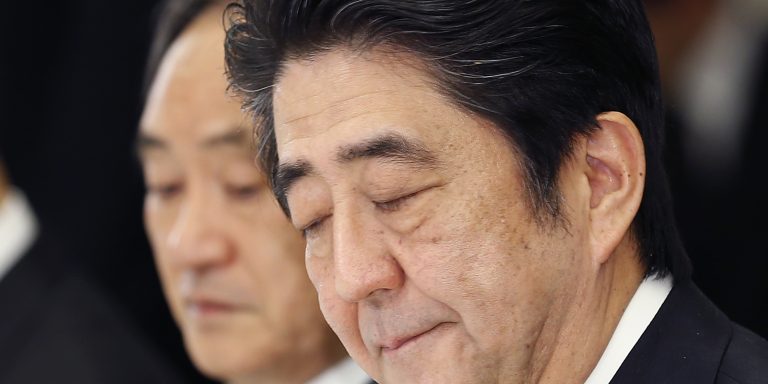INTELBRIEF
September 16, 2020
IntelBrief: A Changing of the Guard in Japan or Staying the Course to Seek Stability?

Bottom Line Up Front
- In late August, Japanese Prime Minister Shinzo Abe announced he would be stepping down to deal with lingering health issues at a time of great uncertainty in Japan, as the country deals with the fallout from COVID-19.
- Abe will be succeeded by Yoshihide Suga, his longtime chief cabinet secretary in the conservative Liberal Democratic Party, who will likely seek to continue many of Abe’s policies in an effort to stabilize Japan.
- Once Suga is officially elected prime minister this week as many predict, he is expected to continue some of Abe’s signature policies, including revising Japan’s Constitution to engineer more freedom of action for its military.
- In many ways, Japan is caught in the middle of U.S.-China tensions, in a delicate balancing act to navigate relations between Tokyo’s security-centered alliance with Washington, and its economic and trade relationship with Beijing.
In late August, Japanese Prime Minister Shinzo Abe announced he would be stepping down to deal with lingering health issues. His resignation caught many by surprise, and signaled a possible shakeup in Japanese politics amidst a time of great uncertainty, as Tokyo deals with the fallout from COVID-19, ongoing economic challenges, and the persistent threat of a rising China and an unpredictable North Korea. Japan is the world’s third largest economy, but has been struggling to manage the economic devastation wrought by the coronavirus. The Tokyo Olympics, originally scheduled for this past summer, were postponed until 2021. Japanese officials are scrambling to ensure that the Olympics can take place without incident and that Tokyo can showcase its soft power for the world to see.
Prior to Abe’s resignation, the conservative politician—a well-known nationalist—was Japan’s longest serving prime minister, having held the post since 2012. Abe will be succeeded by Yoshihide Suga, his longtime chief cabinet secretary in the conservative Liberal Democratic Party, which controls Parliament and has dominated Japanese politics for decades. During Abe’s first stint as Prime Minister in 2006-2007, Suga served as minister of internal affairs and telecommunications, earning a reputation as a loyal and effective bureaucrat. Many observers of Japanese politics believe that Suga will seek to serve as a bridgehead of stability, continuing many of Abe’s policies in an effort to provide a moderating influence.
Japanese politics are notoriously resistant to change, and Suga’s ascendance is thought to be reflective of a steady, if rather uninspiring, choice to lead the country during one of the most volatile periods in recent memory. Preliminary polls show that Suga maintains widespread support from the Japanese public. If Suga is officially elected as prime minister this week as many predict, he is expected to continue some of Abe’s signature policies, including revising Japan’s Constitution to engineer more freedom of action for its military. With the ever-present threat of an increasingly aggressiveChina next door, Japan has been more active in cultivating new potential military alliances, in an effort to counterbalance Beijing. This includes warming relations with Australia and India, which has angered policymakers and military leaders in China. Suga may also adhere closely to the economic policies of his predecessor, focused on easing monetary policy, increasing government spending, and structural reforms—known widely throughout Japan as ‘Abenomics.’
In many ways, Japan is caught in the middle of U.S.-China tensions, in a delicate balancing act to navigate relations between Tokyo’s alliance with Washington, and its economic and trade relationship with Beijing. The United States has long provided military protection for Japan, while China has become indispensable for Japan’s economic health. Japanese exports to China stood around $140 billion in 2019 alone. But many longstanding U.S. allies, Japan included, are being pressured to choose sides in the growing dispute between the United States and China. Concern over 5G technology and sanctions surrounding Chinese tech giant Huawei have given many Japanese companies pause in how to proceed. Mr. Abe proved particularly adroit at balancing relations with both U.S. President Donald Trump and Chinese President Xi Jinping. Suga will have a difficult agenda from his first day in office.